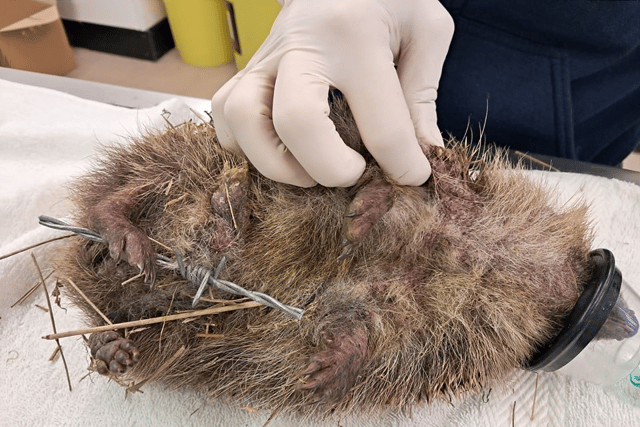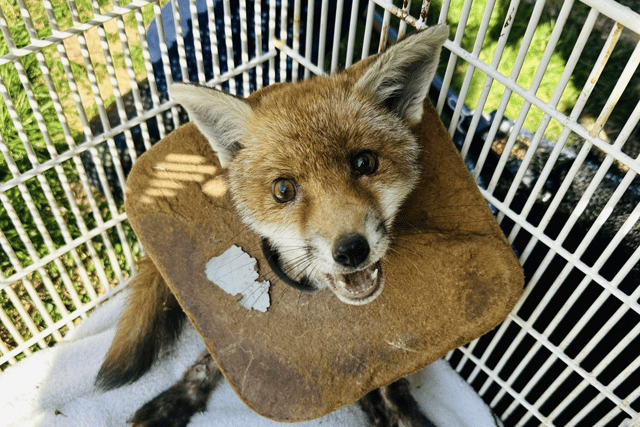RSPCA: Animal charity reports 13,000 calls about animals 'trapped, mutilated, or killed' by litter
and live on Freeview channel 276
A hedgehog tangled in old barbed wire and a great black-backed gull whose leg became almost completely detached by an old fishing line are just two of thousands of distressing, litter-related cases the RSPCA has had to deal with.
New data released by the animal welfare charity on Wednesday (13 March) revealed its centres had received almost 13,000 reports of animals severely injured, trapped, mutilated, choked or even killed by "carelessly discarded litter" over the past four years. During peak months last year - May through to August - it received an average of 13 calls a day.
Advertisement
Hide AdAdvertisement
Hide AdThe RSPCA is now urging Britons to help "create a better world for every animal" by getting involved in Keep Britain Tidy’s Great British Spring Clean, which starts this Friday, and runs to 31 March. Individuals, groups or schools can pledge their support and set a goal as to how many bags of litter they intend to pick up, with more than 400,000 collected last year.


The data showed that among mammals, foxes, hedgehogs, and deer had the highest number of litter-related reports, while swans, pigeons, and gulls were the most-affected birds. However, the RSPCA also received reports of family pets, like cats and dogs, getting caught in or injured by litter. Greater London had the highest number of reports of any county, at 1,439 over four years, followed by Devon (594), Kent (526), Greater Manchester (500), and the West Midlands (437).
"Our rescuers deal with thousands of avoidable incidents every year where animals have been impacted by litter," RSPCA anti-litter campaigns manager Carrie Stones said. "Old drinks cans and bottles, plastic items and even disposable vapes are just some of the items that pose a danger to our wildlife... Animals can ingest the litter or become entangled, leading to injuries, mutilations, and even death."


She said sadly, for every animal they were able to help, there were probably many others that went unseen or unreported. "But the public can help us protect animals, and avoid these incidents happening in the first place." Spring was an ideal time to go on a litter-pick, Ms Stones said, because it fell before the breeding season when young animals like fox cubs were most at risk of getting into trouble. Litter in hedges would also be more visible to pickers before the vegetation started growing. "But it’s also really easy for the public to help at all times of the year. When people are out and about, we urge them to hold on to their litter until there is an opportunity to dispose of it safely and responsibly - or recycle where appropriate. As we all strive to create a better world for every animal, this could save an animal’s life."
Advertisement
Hide AdAdvertisement
Hide AdAs well as everyday rubbish, the RSPCA also saw many animals arrive into its care with terrible injuries caused by angling litter, such as discarded fishing line, hooks and plastic netting. Around 40% of all litter-related calls to the RSPCA last year were about animals that had specifically become caught in fishing litter, she said.
"We strongly urge those who enjoy fishing to be extra cautious to make sure nothing is left behind. Most anglers are very responsible when disposing of their litter, but it only takes one piece of snagged line to be left in a tree or dropped near the water to endanger the life of an animal. " The RSPCA advised anglers make use of the Angling Trust's recycling schemes, to dispose of their waste tackle.
The charity also warned that throwing away food scraps - even biodegradable ones - wasn't safe for wildlife either. Ms Stones said: "If an apple core or fruit peel is thrown from a passing vehicle or discarded by the roadside, it can attract many kinds of wildlife - from mammals to birds - and put them in danger of passing vehicles."
You can sign up for the Great British Spring Clean in England, or the Spring Clean Cymru in Wales online here.
Comment Guidelines
National World encourages reader discussion on our stories. User feedback, insights and back-and-forth exchanges add a rich layer of context to reporting. Please review our Community Guidelines before commenting.
